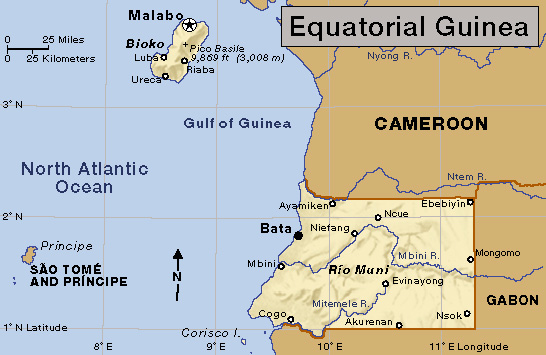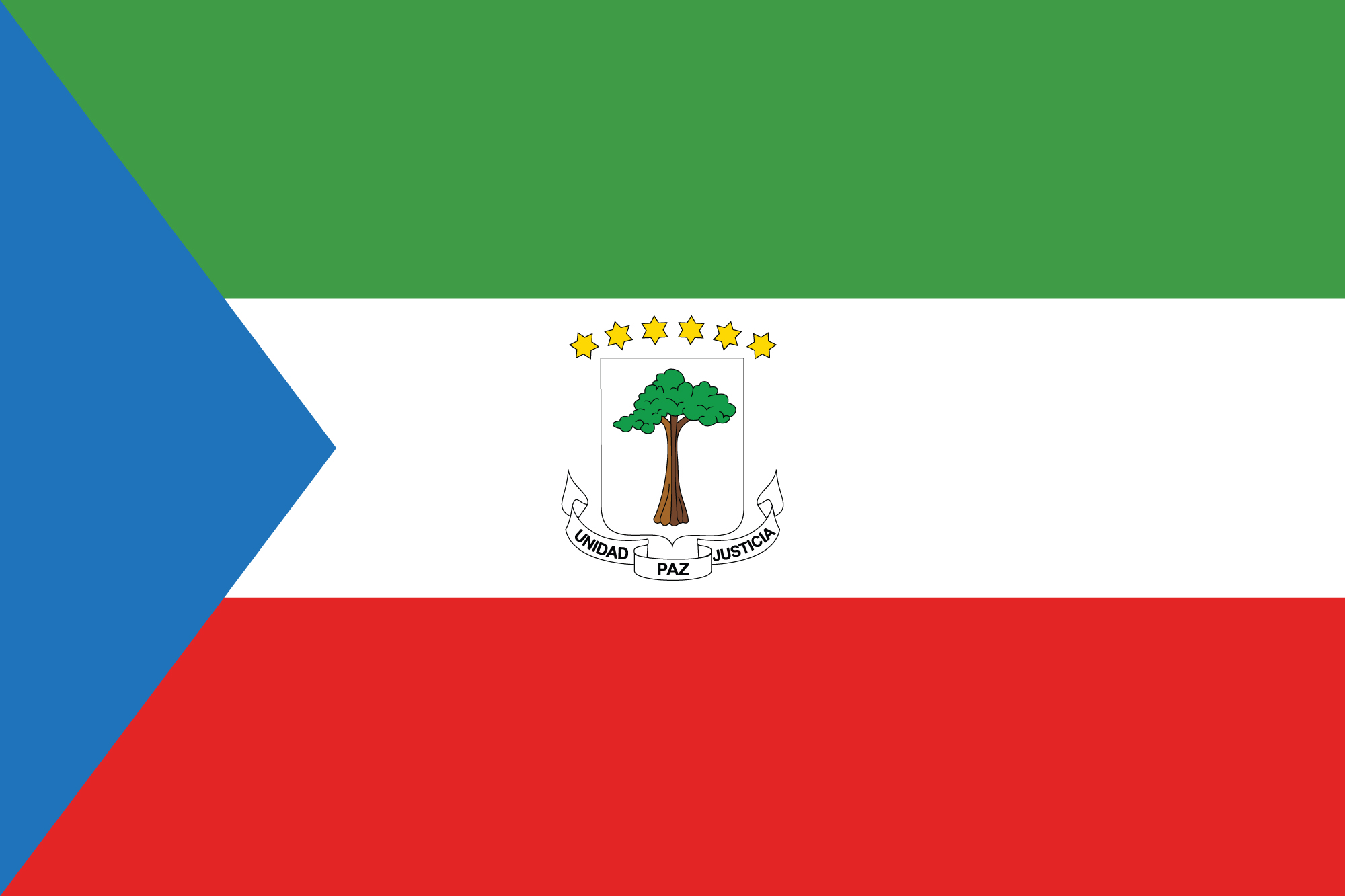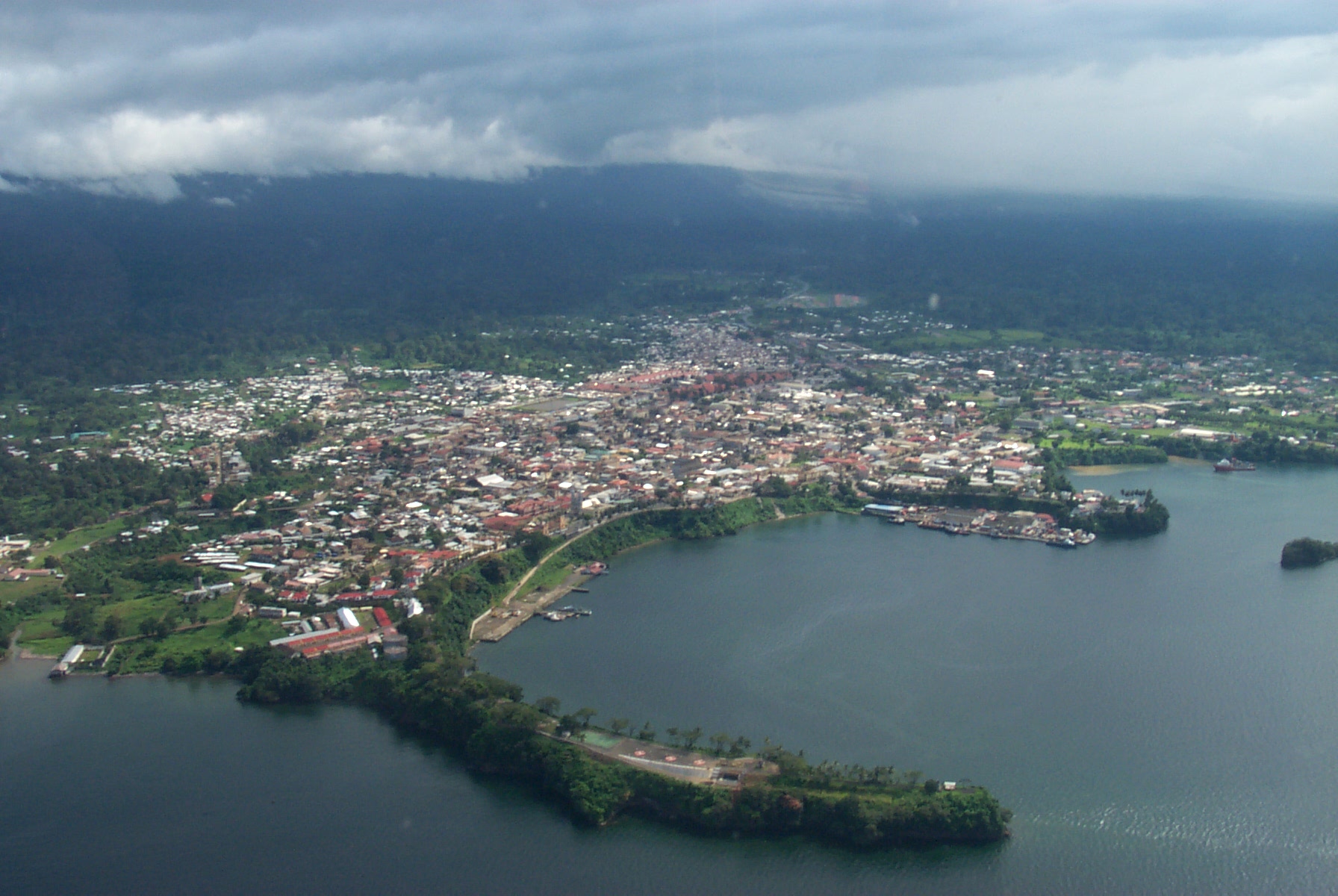Equatorial Guinea << GIHN ee >> is a small country in western Africa. It consists of a territory on the west coast of the continent, plus five offshore islands. Most of the nation’s people live in the territory, Río Muni, which lies between Cameroon and Gabon. The largest island, Bioko (formerly Fernando Po), is in the Gulf of Guinea, about 100 miles (160 kilometers) northwest of Río Muni. The other islands—Corisco, Elobey Chico, Elobey Grande, and Annobón—are southwest of Río Muni. Malabo is the nation’s capital. Bata is the largest city of Equatorial Guinea.

Equatorial Guinea became independent in 1968. It had been ruled by Spain since the mid-1800’s.
Government.
A president is Equatorial Guinea’s most powerful official. The people elect the president to a seven-year term. A Senate and a Chamber of Deputies make the country’s laws. Voters elect all members of the Chamber and most members of the Senate to five-year terms. Some members of the Senate are appointed by the president.
People.
About 80 percent of Equatorial Guinea’s people live in Río Muni. Most of the people in Río Muni are members of the Fang ethnic group. The Fang are closely related to the people of neighboring Cameroon and Gabon. Most of the people of Bioko belong to the Fernandino or Bubi ethnic groups.

Most of the people who live in Equatorial New Guinea’s rural areas are farmers. Others fish or work in lumber camps for a living. Many of the urban people work in small industries or in import-export activities.
Spanish, French, and Portuguese are the official languages of Equatorial Guinea. Spanish is used in the government and in the commerce and schools of the country. The most widely spoken African language is Fang. Roman Catholicism is the most widespread religion in Equatorial Guinea. Most of the people are Catholics.
The law requires children in Equatorial Guinea to go to school until the age of 12. However, many do not attend because of a shortage of teachers. The National University of Equatorial Guinea is in Malabo.
One of the nation’s major problems is its limited health service. Equatorial Guinea has only a few physicians, and the lack of health care has caused the spread of malaria, measles, and other diseases.
Land and climate.
Dense tropical rain forests cover much of Equatorial Guinea, but plains line the coasts of Río Muni and Bioko. Crops of bananas, coffee beans, and cacao (beans from which cocoa is made) thrive in the rich volcanic soil of Bioko. The soil of Río Muni is poor for agriculture, but coffee is grown in the territory, and wood from Río Muni’s forests is used for lumber.
Equatorial Guinea has a hot, humid climate. Temperatures average higher than 80 °F (27 °C). The annual rainfall varies from 76 inches (193 centimeters) in Malabo to 430 inches (1,090 centimeters) in Ureca.
Economy
of Equatorial Guinea is based chiefly on oil and natural gas production. Large oil and gas deposits were discovered near Bioko in the mid-1990’s. Since then, Equatorial Guinea’s economy has grown rapidly. Petroleum accounts for most of the country’s exports.
Agriculture is another important economic activity in Equatorial Guinea. The main food crops include bananas, cassava, plantains, and sweet potatoes. The nation produces much cacao for export. Most of the cacao comes from Bioko.
Equatorial Guinea has many trees, and forestry is important to the economy. The okoumé tree, the country’s most important tree for timber, is used to make plywood. Equatorial Guinea has some food-processing plants and sawmills, but little manufacturing. The country has many undeveloped mineral resources, such as gold, iron, and manganese.
The chief ports include Bata, Luba, and Malabo. Malabo also has an international airport. The government of Equatorial Guinea operates radio and television stations.

Equatorial Guinea exports more than it imports. In addition to petroleum and cacao, the country also exports chemicals and timber. Equatorial Guinea imports food, machinery, and transportation equipment. The country’s important trade partners include China, Spain, and the United States.
History.
Pygmies were probably the earliest people who lived in what is now Río Muni. They inhabited the area before the 1200’s. Various ethnic groups, including the Bubi, Benga, and Fang, then occupied the Río Muni area until the 1700’s. Bubi from the mainland settled on Bioko during the 1200’s. They were the first people to live on the island. The Portuguese landed on Annobón in 1471. They later claimed Annobón, Bioko, and part of the mainland coast. Spain gained control of these territories in the mid-1800’s and made them a colony in 1959.
Equatorial Guinea became an independent nation on Oct. 12, 1968. Later that year, Francisco Macías Nguema took control of the government as president and dictator. In 1970, he dissolved all political parties and formed a single organization to replace them. During the 1970’s, most of Macías’s political opponents fled the country or were imprisoned or killed. In 1979, a group of army officers led by Lieutenant Colonel Teodoro Obiang Nguema Mbasogo overthrew Macías and established a military government with Obiang Nguema as president. In 1989, Obiang Nguema was elected president in an election in which only his party, the Democratic Party for Equatorial Guinea, was allowed. In 1991, Equatorial Guinea adopted a new constitution that provided for a multiparty system. In 1996, 2002, 2009, 2016, and 2022, Obiang was reelected president. Opposition groups called all five elections fraudulent. In 2017, the government moved its headquarters to a new administrative capital, an inland city that is still under construction.
See also Malabo.
